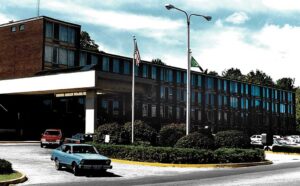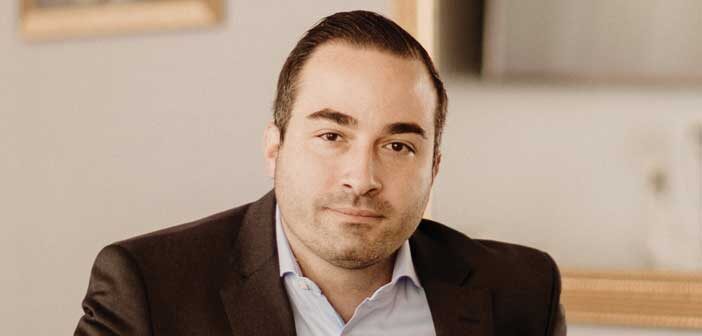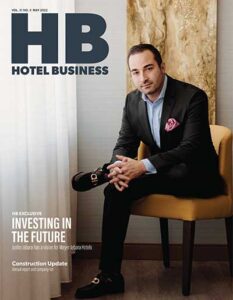The all-American road trip. Images of station wagons, amusement parks and family antics probably come to mind. For Justin Jabara, president, Meyer Jabara Hotels, however, family road trips looked a whole lot different. The destinations were probably the same, but the stops along way included hotels—a whole portfolio of them.
“Growing up in the industry, on family vacations, we were going to tour hotels and then maybe we would stop at Dorney Park for an hour and then get back on the road and go to more hotels,” Jabara told Hotel Business. “I was literally born into the business. I didn’t have babysitters; I had the front-desk agent, who was off and looking for a couple extra dollars, or the housekeeper. As I got older and my father would be in meetings, he would stick me in the kitchen. That was my source of getting taught [the business]and to spend time with my father.”
Meyer Jabara Hotels is a third-generation company that owns and operates a diverse portfolio of hotels and is the product of two families’ passion for hospitality and company culture.
Justin’s father, Richard Jabara, CEO, leads the organization from its Danbury, CT, office, tending more to the operations, project management and hotel design and renovations end of the business. William (Bill) Meyer is chairman of the company and maintains his office in West Palm Beach, FL, with a focus on finance, legal real estate and development.
“It’s very rare in today’s world,” Jabara said. “We have two families that have stayed in business so long and have such a great relationship personally and business-wise. Bill’s father and my grandfather were in the hotel business together. Bill and Richard have been in business for 45 years. I am the third generation.”
The road trips certainly paid off, as Jabara continued not only visiting the hotels but working in them as well. In fact, instead of going to camp in the summer, he would live in one of the hotels. His first job was working room service.
“I remember just being amazed at how much money you could make doing room service and I loved it,” Jabara said. “I also remember dropping a glass of wine in the elevator off the tray; it was awful.”
From room service, Jabara went to go work the back line in the kitchen catering and cooking food, then he was on the front line working with chefs. “It was very important to my father that I worked all of these positions and understood them,” he added.
From there, he went to school for hospitality, working full-time as a bellman and eventually moving to guest services and sales.
“I graduated from Johnson & Wales with a degree in hospitality and then my father said, ‘OK, now you are to go into the business,’” Jabara said. “He sent me to a property in Clinton, NJ, a Hampton Inn. There were opportunities there, but it was trial by fire. I’d never been a general manager; I’d only stayed in Hampton Inns. I took that property over and when I left, it was one of the top-performing Hampton Inns in the system.”

The Danbury Holiday Inn in Danbury, CT, was the first hotel that Richard Jabara and William Meyer purchased in 1977.
For years thereafter, Jabara worked in a task force of the company going wherever he was needed. It wasn’t until he was hotel manager at the Courtyard Marriott LaGuardia Airport in New York that he started moving over to the development side.
“That’s when Bill really took a large role in my life because as I learned development—that was Bill’s big piece of the organization,” Jabara said. “Bill’s a lawyer by trade; a magnificent mind. He hand-trained me for many years. I started growing the organization and managing the portfolio. That’s what’s different about Meyer Jabara—while we do third-party management, it’s just a piece of our business. We personally have equity stakes in a large piece of the portfolio.”
For many years, Jabara led the development functions and from there, he stepped into the president’s role, a lifelong goal of his.
“It was a long path to get there,” he said. “I attribute a lot of my success to the mentorship of my father, but also Bill Meyer. [He] has been just the most spectacular mentor, and I look at him as a father also. He’s confided in me over the years because it’s two families. As president of the organization, I represent both families.”
Although Jabara had just seen his dream come to fruition, he was about to get the ultimate test of his ability—a test that even industry veterans had never been challenged with: a worldwide pandemic.
“My grandfather was integral in giving me a barometer in life, but also business, and one that I really did not think I was going to need so soon,” he said.
When Jabara took the helm in January 2020, he had a great plan that he was working on for some time. The president envisioned what the next couple of years would look like under his stewardship, but then March 15, 2020, arrived.
“I’ll never forget the revenue managers gathering in front of my office,” Jabara recalled. “It was like the sky was falling. Is this really happening? Bill and Richard have been through many recessions, financial crises, you name it, but this…it just looked different, it felt different. It was overnight that customers stopped traveling. There weren’t any airplanes in the sky.”
Jabara knew the company needed to adapt—and needed to do it quickly.
“We went from having the best year we’ve ever seen to having nobody staying in hotels,” he said. “I’ve never seen empty hotels. With our sized portfolio and our scale of organization, that required quick action. I’ll never forget sitting in this office and thinking to myself, ‘We just need to make it another day. And if we can make it another day, we’ll be able to make it.’”
Jabara knew that the company needed to reorganize, but also needed to rely on its people. Culture is paramount for Meyer Jabara; it’s even coined the company culture as The Journey—leadership tools and principles that shape its unique culture.
“In West Palm Beach, in one of our offices, we set up a war room where ownership and senior management had to deal with partners, lenders, brands and associates,” Jabara said. “For months we were the only people in the building. How do you go from running a hotel at 90% to 7%? It doesn’t get easy. We said the way we’re going to get through this is with the people of Meyer Jabara, and it was the only way that we would be able to weather this storm. We needed to dig in our foxholes, and we were going to war.”
The first few months of COVID were defining moments for Jabara. Although there wasn’t a playbook or set principles for how to weather the COVID storm, he kept returning to The Journey.
“We decided to hold up the mirror to ourselves as an organization,” he noted. “The parameter we used is what’s going to set us up for success for another 45 years. When we held that mirror up to ourselves as an organization, at the property level and at the corporate level, we proceeded to have a series of really honest and frank conversations with our department heads who were still there.”
Jabara, along with senior folks, tackled the organization function by function, department by department, and drew up a plan of what the future of the company needed to look like.
“While many other hoteliers were closing hotels and laying off a majority of their employees, we decided we would not. We decided we would take that money, funded by Richard and Bill, and invest in systems that would support our company,” Jabara said.
He continued, “While we were hunkered down, we started working on the overall platform of Meyer Jabara and it wasn’t because it was broken—we were having the best years of our lives—but it was because we believed in the culture and The Journey and that we really could come out of this a better organization, not a battered organization,” he said.
The first department that the team looked at was sales and marketing, which resembled a very traditional structure of how a hotel management company supports a portfolio of properties, Jabara said.
“We have a full list of departments that many other companies our size have, and we said this structure doesn’t work and our team was telling us that this structure doesn’t work,” he said. “We went on a learning journey and started interviewing our people and people outside the industry, people who were experts within our industry, and ultimately, what surfaced was a commercial strategy department that no longer contained silos.”
The new structure was more of a cross utilization of individual specialties not focused on top-line revenue, but rather on net revenue.
“We built this whole commercial strategy department and restructured everything from how we do revenue management [and]what revenue management focuses on, to the tools of revenue management as well as digital marketing and e-commerce,” Jabara explained. “We went out and it sounds crazy, but we started hiring people during these terrible times.”
While people were getting laid off, Meyer Jabara hired regional sales folks, with the goal of making the organization more competitive and allow it to perform better through COVID and beyond.
“Bill and Richard supported this bold initiative, they said, ‘Go do this,’” Jabara said. “We started with what was sales and marketing and ended with a whole commercial strategy broken down into all these different functions, which is now totally up and running.”
Jabara explained that the organization discovered it was using old metrics and needed to reshape how it viewed good hotel performance, which brought it to the next stage of its learning journey: data.
“I always said we need to be a data-first organization,” Jabara said. “We had historically written many of our business intelligence systems, but we moved over to a large enterprise system which took a significant capital investment. We also had to start hiring people who were experts in data. We brought on a data architect, which if you asked me two years ago what a data architect did, I would have had no idea. If you asked me today, I think I’d still only know 60%-70% of what that data architect does.”
The organization then needed to bring on people who specialize in integration of these complex systems.
“We have different PMS systems and enterprise systems that all flow into one major platform utilizing a network of proprietary software,” Jabara added. “This enterprise platform allows us to get data at speed with a level of accuracy that is paramount.”
The company also invested heavily into its accounting department, and again, not because it was broken, but because Jabara knew they could always be better. The company upgraded systems and looked outside the industry for technologies that could perform tasks more efficiently, accurately and at a faster rate.
“We rolled out an AI technology allowing us to process through specific accounting information at a much quicker pace and with less effort at the property level,” Jabara said. “We also hired some key accounting personnel there.”
While doing all of this, the company had a great opportunity to bring on an SVP of food and beverage, who Meyer Jabara believes to be critical to the organization going forward.
“We kept investing into the enterprise, making Meyer Jabara better during the whole time,” Jabara said. “I also traveled through COVID, and I always said what was going to get us through was [our]people. When I traveled to the properties, I felt it. When you have general managers stripping beds and washing sheets and they’re the only people in the laundry rooms, I felt it. I think everyone learned that they could do multiple jobs. I’ll never forget walking into a hotel and the general manager’s son was standing with her folding sheets.”
Meyer Jabara continued to invest in its people throughout the past two years and has also brought on a VP of development and VP of investments and asset management, and it is in the final stages of bringing on an SVP of investments to build out the entire platform.
Although Jabara noted the organization’s low turnover rate, The Journey principles took the company to HR as the next stop on its learning process.
“We can’t be second best anymore because you’ve got Amazon down the street and they’re attracting our front-desk agents and our housekeepers; we’re a business of people and we must be a world-class employer,” he said. “We had to rethink all of our benefits and the way that we pay. Why does somebody wait two weeks to get paid? It doesn’t make sense. They worked, they should get paid. Think about your life and mine. If you go out to dinner and someone owes you cash, they send you some on Venmo. It’s instant.”
So, Meyer Jabara enacted digital wallet, which, according to the president, has been spectacular. The company has also brought on a new head of HR, doubling down on its culture.
“COVID, I think, was the ultimate litmus test to our organization and proof that The Journey culture works,” he said. “It was our people who got us through.”
While taking on a new role, drawing up the future of his family’s company and having to survive arguably the worst crisis the industry has seen, Jabara was also going through some personal milestones.
“It’s hard to believe it’s been two years, but what’s even harder for me to believe is what was going on in my personal life,” he said.
Jabara was engaged and set to get married later in 2020, which was rescheduled a few times.
“I’ll never forget my father just looked at me and said, ‘You’re getting married. Enough’s enough. We can’t wait around for COVID to go away,’” Jabara recalled.
And sure enough, in September 2020, Jabara and his now wife exchanged vows at his father’s home. Little did the couple know that in a few short months, another milestone was about to bless them.
“I was going to one of our board meetings and that morning before I left, my wife says, ‘I think I’m pregnant,’” Jabara said. “I sat through that whole board meeting—it was large meeting with a lot to report on—and then she sent me a text: ‘It’s official. I’m pregnant.’”
In September 2021, just one day after the couple’s first anniversary, Jabara and his wife welcomed a beautiful girl into their lives.
Balancing family and business is nothing new for Jabara and the organization at large, and it even seems to function better when the two blend—reflective of the company’s beginnings.
“That’s the beauty of Meyer Jabara—everybody is family,” Jabara said. “I really hope COVID never happens again, but what it did do was it positioned our organization at a precipice where we could have taken two paths: we could have stayed in our foxhole and stayed hunkered down and hoped to live for another day, or we could have done what we did. While money was going out the door, Bill and Richard had enough faith in me and the senior leadership team to say we’re going to invest in this and become an even better organization because of this, and that takes a lot of guts.”
The company was able to keep its existing portfolio intact, which Jabara believes to be a testament to its people and partners. In fact, it grew its portfolio by 20%, bringing on a handful of hotels and expanding into boutique and extended-stay properties.
The organization continues to dig in hard on development, investing heavily in smart growth.
“Our goal is to have the best portfolio—not the biggest, but the best,” Jabara said. “We have a nice pipeline ahead of us with a focus on extended-stay and boutique in prominent markets…On the operations side, it comes down to three legs of the stool: our people, our guests and our owners, and balancing those legs. We also have new capital partners.”
Jabara said the company will also continue to invest in technology and its people, noting that it’s expensive, but it’s what counts and pays off in the long run.
“Personally, coming out of COVID, having a beautiful seven-month-old little girl where every morning I wake up and get her up; that’s the way I go to work,” he said. “When I come home, I put her to bed, and that’s our life…It’s been an unbelievable two years. When I look at my father, Bill and my grandfather, and the way Bill and Richard brought me up through the industry and the level of mentorship that they gave me through my career, some of that was tough. It’s not easy growing up in the hotel business but without that, I don’t think we would have been as successful.”
Continuing to evolve and grow as an organization are some professional goals for Jabara. He grew up in the business surrounded by both mentors and family. And now, he’s looking to propel the company into the future with The Journey culture as a foundation. As for personal goals, however, Jabara turns to his life at home.
“It’s all happened very quickly with a lot going on around me,” he said. “At the end of the day, I want to be the best father to this little human that’s in our lives and the best husband to my wife. If I can do those things in the future, those are pretty good goals for me.”



